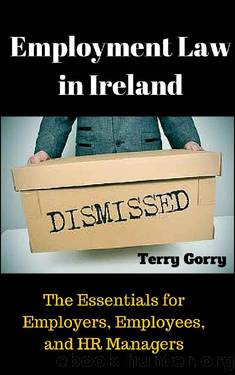Employment Law in Ireland by Terry Gorry

Author:Terry Gorry [Gorry, Terry]
Language: eng
Format: epub
Publisher: Terry Gorry
Published: 2014-07-29T05:00:00+00:00
Chapter 14-TUPE-The Transfer of Undertakings Directive and Regulations
TUPE or the Transfer of Undertakings Directive of 1977, which became part of Irish law by the European Communities (Safeguarding of Employeesâ Rights on Transfer of Undertakings) Regulations, 1980, protects the rights of employees where the business in which they are employed is transferred to a new owner.
It is a significant piece of legislation if you are selling your business or if you are working in a business which is being taken over.
Statutory instrument 131/2003 The European Communities (Protection of Employees on Transfer of Undertakings) Regulations, 2003 revokes and repeals previous legislation in this area and contains all law relating to transfer of undertakings in a single statutory instrument.
What is an undertaking?
It is important to note that the TUPE directive covers undertakings and businesses or parts of undertakings and businesses-this leads to the critical question of what an undertaking is and as there is no definition in the legislation it has led to much case law with each case being decided on its own particular facts.
It is clear, though, that the following fall within the definition of an âundertakingâ for the purposes of the TUPE regulations:
-schools, colleges, educational institutions
-charities
-local authorities
-health boards
-trade associations
-trade unions
-State and semi-State bodies.
Key elements of the TUPE regulations
The key thrust of the TUPE directive is that the rights and obligations in respect of employment contracts of the transferring business are transferred to the new business.
-There must be a change of employer-this is a fundamental criterion
-A change of employer can occur where full ownership does not change (management responsibility may change and transfer to a subsidiary for example)
-Employee and trade union contractual entitlements survive post transfer regardless of whether the purchasers is aware of these entitlements or not
-There must be continued recognition of employee representatives
-Pension entitlements are excluded insofar as they do not have to be continued by the new company
-The parties to a transfer have an obligation to notify, inform and consult with employees or their representatives before the transfer takes effect
-If TUPE legislation is breached the problem rests with the new business (the transferee)
-The TUPE directive does not apply where the reason for the transfer is the insolvency of the transferring business.
-TUPE also does not apply where the business is transferred by a transfer of shares
-TUPE may apply even where there is no agreement between the two businesses, for example where a lease or franchise is surrendered by operation of law.
How businesses change hands
There are broadly three ways that a business can change hands:
1. Sale of shares-TUPE does not apply
2. Sale of assets and goodwill to new operator
-the sale of a business will be covered
-the sale of assets alone, without goodwill, may not. It will depend on the circumstances of the case. The key determining factor will be the retention of the identity of the business or economic entity which transfers.
3. Transfer by operation of law or other indirect means-if the business is continued by the person or body to whom it is transferred/surrendered there is a transfer of undertaking.
Download
This site does not store any files on its server. We only index and link to content provided by other sites. Please contact the content providers to delete copyright contents if any and email us, we'll remove relevant links or contents immediately.
Bullshit Jobs by David Graeber(4179)
Radical Candor by Kim Scott(2713)
I Am Right, You Are Wrong by Edward De Bono(2440)
23:27 by H. L. Roberts(2245)
Nomadland by Jessica Bruder(2058)
Average Is Over by Tyler Cowen(1845)
The Conflict Resolution Phrase Book by Barbara Mitchell & Cornelia Gamlem(1773)
Out of Our Minds: Learning to Be Creative by Ken Robinson(1740)
High-Impact Interview Questions by Victoria A. Hoevemeyer(1691)
The Ideal Team Player by Patrick M. Lencioni(1640)
An Everyone Culture: Becoming a Deliberately Developmental Organization by Robert Kegan & Lisa Laskow Lahey(1631)
Who Moved My Cheese?: An Amazing Way to Deal With Change in Your Work and in Your Life by Johnson Spencer(1628)
The Asshole Survival Guide by Robert I. Sutton(1598)
Automatic Society by Bernard Stiegler(1548)
Unleashed by Anne Morriss & Frances Frei(1538)
Who by Street Randy & Smart Geoff(1501)
42 Rules of Employee Engagement by Susan Stamm(1474)
96 Great Interview Questions to Ask Before You Hire by Paul Falcone(1451)
Fish! by Stephen C. Lundin(1398)
